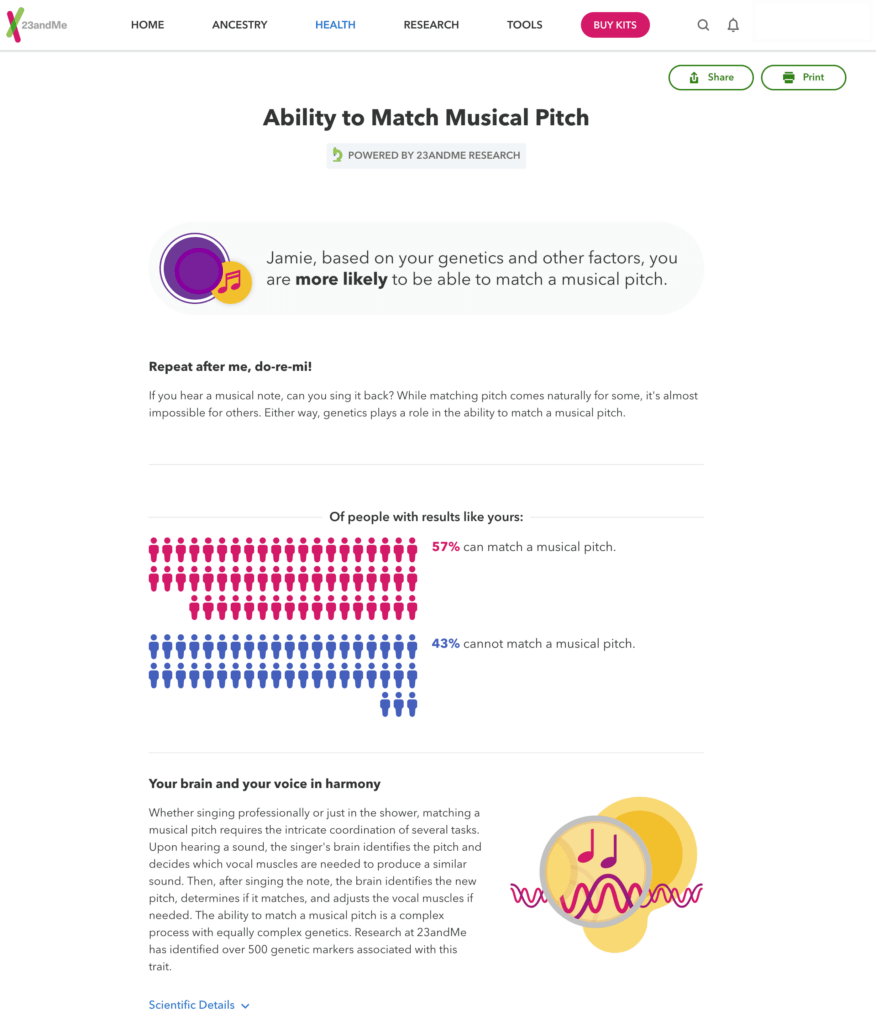Ability To Match Musical Pitch: 23andMe Trait of the Day

Table of Contents
Ability to Match Musical Pitch and why it’s Important
The ability to match musical pitch, often referred to as having a “good ear,” is the ability to accurately reproduce or identify musical notes. This ability is essential for various musical skills, such as singing in tune, playing a musical instrument, or transcribing music. Musicians with a good ability to match pitch can listen to a song and play it back or sing it with little error. For singers, in particular, this ability is crucial to harmonizing, improvising, and staying in tune with a band or backing track.

What is Musical Pitch?
Musical pitch is a perceptual property that allows the ordering of sounds on a frequency-related scale. Pitches are usually associated with and thus quantified as frequencies, being the number of cycles per second (hertz) of sound waves. A high-pitch sound corresponds to a high-frequency sound wave, and a low-pitch sound corresponds to a low-frequency sound wave.
Is Ability to Match Musical Pitch Genetic?
Research suggests that the ability to match musical pitch may, in part, be influenced by genetics. Studies involving families and twins have shown that musical talent, including pitch-matching ability, tends to run in families. However, the specific genes involved are not yet well understood, and it’s likely that many genes contribute to this ability.
This suggests that while some people may have a natural inclination or “genetic advantage” toward pitch matching, it doesn’t negate the importance of practice and training. It’s a combination of both nature (genetics) and nurture (environment and practice) that shape this skill.
The Research
The study titled “Genetic correlates of musical pitch recognition in humans,” by Drayna et al., published in Science in 2001, is an important investigation into the role of genetics in musical ability, specifically pitch recognition.
The study involved a twin study design to understand the heritability of pitch recognition skills. Twins share all (in the case of identical twins) or half (in the case of fraternal twins) of their genetic material. Thus, if a trait is genetic, identical twins, who share all their genes, will be more similar in that trait than fraternal twins, who share only half their genes.
In this study, the researchers tested 136 pairs of female twins for pitch recognition ability, using a Distorted Tunes Test. This test involved listening to familiar melodies that were sometimes presented in a distorted, off-key version. Participants had to identify whether the melodies were played correctly.
The results showed a high correlation in pitch recognition scores between identical twins, suggesting a substantial genetic component to this ability. There was much less correlation in pitch recognition scores between fraternal twins.
Based on their data, the researchers estimated that the heritability of pitch recognition is around 70-80%. This suggests that genetics plays a significant role in this ability, though it does not account for all of the variation, implying that environmental factors and practice also contribute.
However, this study did not identify specific genes associated with pitch recognition. It only showed that such genes likely exist based on the high heritability of this trait.
23andMe Report for Ability to Match Musical Pitch
23andMe, a popular genetic testing company, includes a report on the musical pitch in its health and traits service. The report estimates your likelihood of being able to match a musical pitch based on your genetics.

This report is based on data from a study conducted by 23andMe that identified genetic variants associated with the ability to match a musical pitch. However, as the company itself notes, these findings are preliminary and do not account for all the genetic factors that could influence this ability. Additionally, environmental factors and training also play a significant role, which the genetic report does not account for.
Summary
-
What is musical pitch?
Musical pitch is the perceived frequency of a sound or note, with higher pitches corresponding to higher frequencies.
-
Why is the ability to match musical pitch important?
The ability to match musical pitch is crucial for various musical skills, including singing in tune, playing an instrument, and transcribing music.
-
Is the ability to match musical pitch influenced by genetics?
Yes, research suggests that genetics may partially influence the ability to match musical pitch, but the specific genes involved are not yet well understood.
-
What does the 23andMe report for the ability to match musical pitch tell me?
The 23andMe report estimates your likelihood of being able to match a musical pitch based on your genetics. However, this is a preliminary finding and does not account for all the genetic factors or the impact of environmental factors and practice.
References
- Drayna D, Manichaikul A, de Lange M, Snieder H, Spector T. Genetic correlates of musical pitch recognition in humans. Science. 2001;291(5510):1969-1972.
- Park H, Lee S, Kim HJ, Ju YS, Shin JY, Hong D, von Grotthuss M, Lee DS, Park C, Kim JH, Kim B, Yoo Y, Cho SI, Sung J, Lee C, Kim HN, Seo JS. Comprehensive genomic analyses associate UGT8 variants with musical ability in a Mongolian population. J Med Genet. 2012;49(12):747-752.
- 23andMe. Musical Pitch [Internet]. 23andMe; 2021 [cited 2023 Jul 1].
Written By
Share this article











